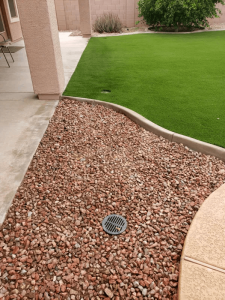As winter approaches, it’s essential to prepare your outdoor paving for the harsh weather conditions that come with colder climates. At Gilbert Paving Company, we understand the importance of winter-proofing your paving to ensure it remains safe and intact during freezing temperatures, snow, and ice. In this guide, we’ll share valuable tips and strategies to help you protect your paving in cold climates.
Contents
Introduction
Cold climates can be especially challenging for outdoor paving. The freeze-thaw cycles, snow accumulation, and de-icing chemicals can take a toll on your paved surfaces. Winter-proofing is the key to preserving the integrity and safety of your paving.
Winter-Proofing Your Paving
1. Seal Your Pavers
Applying a high-quality sealer to your paving is one of the most effective ways to protect it from winter damage. Sealants create a protective barrier that prevents moisture penetration, reducing the risk of cracks and surface erosion.
2. Fill Cracks and Potholes
Before winter arrives, inspect your paving for any cracks or potholes. Address these issues promptly by filling them with appropriate repair materials. This prevents water from seeping into these openings and causing further damage when it freezes.
3. Choose Frost-Resistant Materials
If you’re planning to install new paving in a cold climate, consider using frost-resistant materials. These materials are designed to withstand freezing and thawing cycles without cracking or deteriorating.
4. Elevate or Slope Pavements
Ensure that paved surfaces have a slight slope or elevation to promote water drainage. Standing water can freeze, creating hazardous icy patches. Proper drainage helps prevent this issue.
5. Use Snow Removal Techniques
When snow accumulates on your paving, avoid using metal shovels or sharp-edged tools that can scratch or chip the surface. Instead, use plastic shovels or snow blowers to clear snow without damaging the pavers.
6. Avoid De-Icing Chemicals
Avoid using harsh de-icing chemicals like rock salt on your paving. These chemicals can accelerate the deterioration of your pavement. Instead, use alternative de-icing methods like sand or calcium chloride.
7. Regular Maintenance
Perform regular maintenance throughout the winter season. Inspect your paving for signs of damage and address any issues immediately. Prompt snow removal and de-icing measures can prevent problems from worsening.
8. Professional Help
Consider hiring a professional paving contractor experienced in cold climates. They can provide expert advice and services to winter-proof your paving effectively.
Gilbert Paving Company: Your Winter-Proofing Partner
At Gilbert Paving Company, we’re here to help you prepare your paving for the challenges of winter. Our team of experts can assist with sealing, repairs, and maintenance to ensure your paving remains in top condition throughout the cold season.
Contact us today at 480-534-9680 or visit our website at www.gilbertpaver.com to learn more about our winter-proofing services and how we can protect your paving in cold climates.




